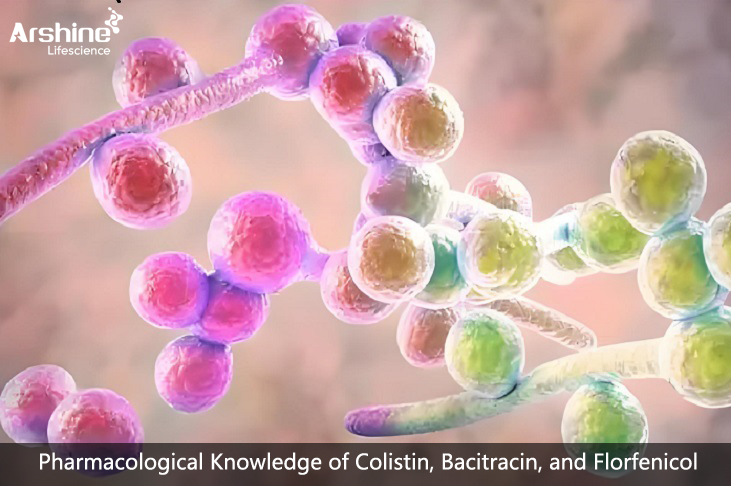

In the wide range of veterinary antibacterial drugs, bacitracin and florfenicol are primarily used in animal farming. Although colistin sulfate has similar counterparts, it is predominantly used for veterinary purposes. To give everyone a clearer understanding, let's discuss these drugs in detail today.
Among veterinary antibiotics, there is a unique class of broad-spectrum antibiotics known as amphenicols. This class originally had three main representatives: chloramphenicol, thiamphenicol, and florfenicol. However, due to food safety and public health concerns, chloramphenicol was banned from use in food-producing animals.
After the national standardization of veterinary drugs, thiamphenicol was gradually phased out due to its high resistance rate, leaving only florfenicol in widespread use. Florfenicol is a broad-spectrum antibiotic that inhibits the growth of many pathogens, including Gram-positive cocci and bacilli such as Staphylococcus aureus, Streptococcus haemolyticus, Enterococcus, Streptococcus pneumoniae, Bacillus anthracis, and Corynebacterium diphtheriae.
It also inhibits Gram-negative bacteria such as Salmonella, Brucella, Enterobacter, Klebsiella pneumoniae, Haemophilus influenzae, Neisseria meningitidis, and Shigella. Florfenicol has some effect against rickettsiae and certain viruses but is ineffective against protozoa and fungi.
This type of antibiotic is highly effective against non-conventional pathogens in livestock and poultry farming, which has made it popular among farmers.
Polypeptide antibiotics in veterinary medicine mainly include colistin sulfate and bacitracin. The antibacterial spectrum of colistin sulfate and bacitracin is quite similar, as they are narrow-spectrum antibiotics with potent activity against most aerobic Gram-negative bacteria.
Non-fermenting bacteria, such as Pseudomonas aeruginosa, Acinetobacter baumannii, and Stenotrophomonas maltophilia, are highly sensitive to them. Enterobacteriaceae, including carbapenem-resistant strains (CRE), also show high sensitivity. However, certain Gram-negative bacteria like Haemophilus influenzae, Bordetella pertussis, Legionella pneumophila, Salmonella, and Shigella show less sensitivity, and some genera such as Proteus, Serratia, Providencia, Morganella, and Burkholderia have natural resistance. Some Gram-negative cocci (Neisseria) and most Gram-positive bacteria are naturally resistant to polymyxins.
Colistin has strong bacteriostatic or bactericidal activity against most Gram-negative bacilli, excluding Proteus. It is mainly used for carbapenem-resistant Gram-negative bacteria (CRO), such as carbapenem-resistant Enterobacteriaceae (CRE), carbapenem-resistant Acinetobacter baumannii (CRAB), and carbapenem-resistant Pseudomonas aeruginosa (CRPA).
Colistin's positively charged diamino-butyric acid interacts with the negatively charged phosphate groups on bacterial lipopolysaccharides, leading to polar interactions. Its hydrophobic amino acids at positions 6 and 7 interact with the fatty acid chains in the bacterial membrane, increasing membrane permeability or causing inner and outer membrane contact, destabilizing the membrane and resulting in osmotic imbalance. This leads to cell swelling, leakage of contents, and bacterial death.
Colistin induces the formation of reactive oxygen species (ROS), superoxide, hydrogen peroxide, and hydroxyl radicals in Gram-negative bacteria, causing oxidative stress that damages bacterial DNA, lipids, and proteins, ultimately leading to rapid cell death.
Conversion: 1 mg of colistin sulfate = 10,000 units
In veterinary antibiotics for anaerobic bacteria, there are few drugs highly sensitive to Gram-positive bacteria. Bacitracin-salicylate complex can be combined with highly water-soluble florfenicol for joint use. This combination is highly effective in treating summer diarrhea and severe water loss in livestock and poultry. In addition to its high sensitivity and efficiency, this combination has a short withdrawal period, ensuring compliance with food safety requirements for meat-producing animals within just seven days before slaughter.
Add: Block 14, No.100, Luyun Road, Changsha 410205, Hunan, China.
Email: info@arshinevet.com
WeChat: +8618874001228
WhatsApp: +8615697311407
Tel:86-731-82294958